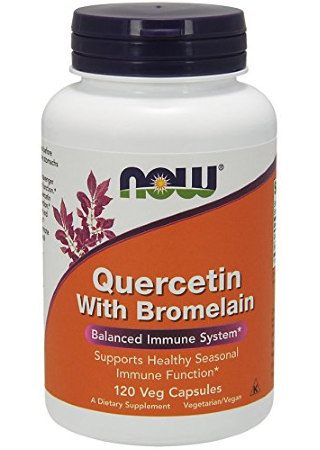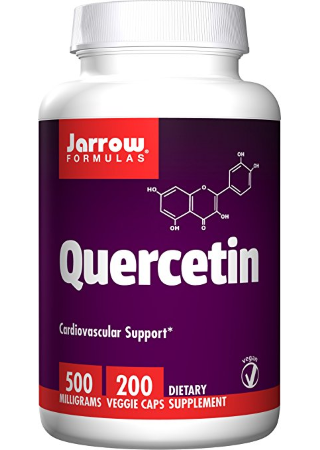There’s nothing beautiful about a red runny nose from allergies. Plus, allergies can get in the way of having fun. So, I decided to do some research and see if there was anything that would help relieve allergy symptoms besides over the counter antihistamines. The first thing I found was raves on the benefits of quercetin for allergies. Separating the fact from the fiction was my goal.
So what the heck is quercetin anyway?
The simple definition:
It’s good stuff that comes from the rind and bark of some plants. It is also synthetically produced.
The not so simple definition:
It’s a yellow powdered crystalline flavonol that occurs naturally as a glycoside. Also called meletin and saphoretin Just in case you don’t happen to already know:
- A flavonol is a large subgroup of flavonoids defined by their chemical composition. In other words, add a little hydrogen and oxygen here and you have one compound. Add it there and you have another.
- A flavonoid is a derivative of flavone. It is a plant based compound.
- Flavones are colorless crystalline compounds that are part of yellow or white plant pigments.
- A glycoside is a compound derived from a monosaccharide (simple sugars like fructose and sucrose).
How does quercetin for allergies work to help stop sneezing and watery eyes?
Quercetin has been shown scientifically to inhibit the body’s production of histamines. Histamines are what the body produces that cause the allergy response. Here’s how it works:
Let’s say you inhale a tiny pollen particle. That tiny pollen grain then lodges in your nose or maybe even manages to make its way into your lungs. Your body says OMG I’m being attacked (it’s exactly the same way it reacts when you get the sneezes from a cold). Now your body goes into hyper war mode. When this happens, histamines flood your body and as a result, your nose starts to run, you sneeze and sometimes have difficult breathing.
Limited studies suggest that when you ingest quercetin the production of histamines is slowed and your allergy response is diminished.
How much quercetin do you need to be effective against allergies?
The short answer: Nobody knows for sure. The research is pretty much nonexistent for dosages that might be effective on humans. That said,
there was one small study done on guinea pigs that indicated a diet enriched with quercetin rich foods showed a reduced level of inflammatory chemicals. Another small study done on mice gave the same results. These results are promising; however a human is not a mouse or a guinea pig so until tests are conducted on human subjects, the results are inconclusive.
However, despite the lack of scientific data, there is considerable empirical evidence that quercetin is effective for many people with allergies.
If I want to use quercetin for allergies, what foods are best to eat?
To answer this question, I went to the USDA database. Their data was presented as mg/100 grams (roughly 3.5 ounces). The problem I had with the data was the enormous difference between the low and high levels for certain foods. For instance, canned capers presented a mean value of 180mg/100g with a low of only 45 and a high of 519.85. I’m sure this difference had to do with what labs were doing the testing and the procedures they used, but it certainly doesn’t fill me with confidence if I’m trying to determine how much of a food to consume.
Despite these difference in hi/low data, the foods with high quercetin levels that were also the most consistent were as follows:
Food mg/100g Buckwheat 23.09 Dry Cocoa Powder 20.13 Raw Cranberry Juice 16.41 Ancho Peppers 27.6 Apples with Skins 4.42 Raw Celery 3.5 Black Tea brewed with tap water 2.07 Green Tea brewed with tap water 2.69
I encourage you to check out the other foods that contain quercetin. You’ll find it here. You’ll find honey missing from the list. However, bee pollen is very high in quercetin. Lab results indicate Manuka honey to have significant concentrations of flavonoids including quercetin.
Can I get quercetin for allergies in pill form?
The short answer is yes. If you do decide to try a supplement, you might want to consider one that also contains bromelain (found in pineapples). Bromelain supposedly allows more of the quercetin to be absorbed. Quercetin with Bromelain is available here. Note: If you are pregnant, have a bleeding disorder, high blood pressure and liver or kidney disease, do not take bromelain. In fact, if you have any medical condition, it’s wise to talk to your doctor before you take any supplements. Quercetin without Bomelain is available here.
Is quercetin for allergies safe?
Quercetin has no known side effects, however, if you have a medical condition and want to take quercetin supplements, run it by your doctor. If you want to use the natural approach and eat foods high in quercetin, that is perfectly safe unless, of course, you have an allergy to a specific food. That’s a big duh, huh?
Conclusion
If you’ve read many of my posts, you probably are aware of how much I loathe hype. If something works, that’s great, but don’t tell me it’s a must have when the evidence is tepid at best. The evidence is somewhat tepid when it comes to using quercetin for allergies. However, there is enough evidence that I think it might be worth a try at a high quercetin diet. It can’t hurt and most of the foods that have significant concentrations of quercetin are good for you anyway. When it comes to supplements, I’m far more reserved. Food supplements are not well regulated. Besides that, synthetically produced food supplements lack the full complement of ingredients found in the real food and that can make significant changes in the way your body responds. Then there’s the problem that little is known long-term term use of higher dosages of quercetin. My opinion may change in the future when more research is done, but for now here’s where I stand on taking quercetin for allergies.
Now go have fun and relax.
Our recommends:
Related Posts:
Super Easy Delectable Apple Recipe with Anti-Allergy Benefits



